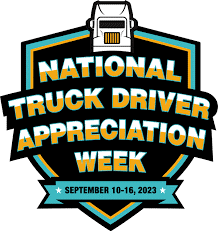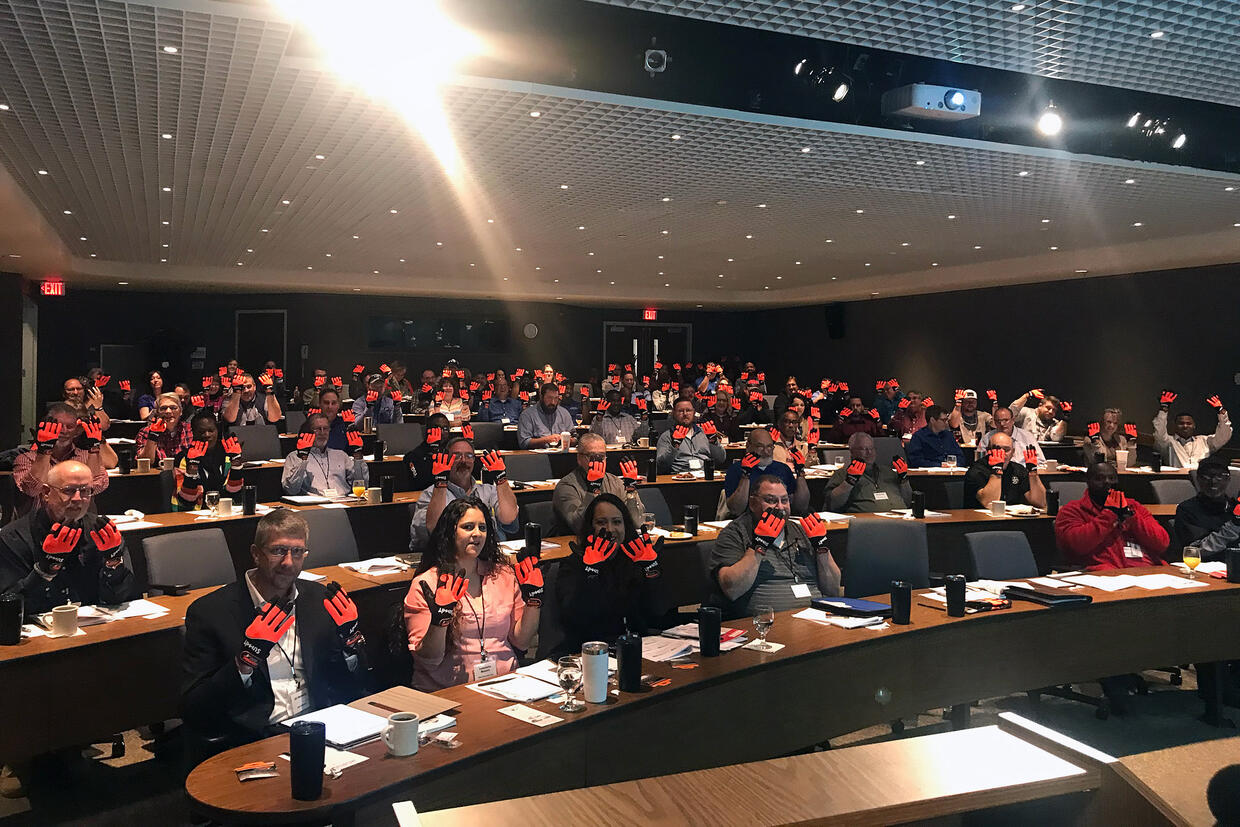Drive Sober or Get Pulled Over
Stay safe and be vigilant this upcoming holiday weekend! Read this week's Safety Bulletin to receive more insight into truck driver injuries and what you can do to prevent them! Read the entire bulletin here and sign up for future safety bulletins delivered to your inbox!
"Drive Sober or Get Pulled Over" is a nationwide initiative to prevent individuals from driving under the influence. It took effect on August 16 and will conclude on September 4. Impaired driving has become a serious safety epidemic in our country. We all have a responsibility to keep our roads safe.
With Labor Day Weekend approaching, many individuals take their last trips of the summer. This holiday increases road traffic, with many individuals taking road trips to nearby destinations. Increased traffic means an increased likelihood of vehicle crashes, and the festive nature of the weekend, unfortunately, lends itself to instances of drunk driving. To keep people safe on the streets, the U.S. Department of Transportation's National Highway Traffic Safety Administration (NHTSA) wants to make sure this busy travel period is a safe one, which is why we're partnering with law enforcement nationwide for the Drive Sober or Get Pulled Over enforcement campaign from August 16 through September 4, 2023, to help put a stop to alcohol-impaired driving.
https://www.nhtsa.gov/campaign/drive-sober-or-get-pulled-over
Labor Day Driving Trips from America's Road Team
The first step towards a safe trip begins in the driveway.
- Do a "walk around" before leaving: Check your vehicle's tires, wipers, and fluids. Have your radiator and cooling system serviced.
- Before you get on a highway, know your exit by name and number, and watch the signs for the exit as you near it. Drivers making unexpected lane changes to exit often cause accidents.
- Get a map or program your GPS: Surprisingly, few motorists use maps, even when driving through unfamiliar areas. Knowing the road is essential for safe driving -- it allows you to anticipate the road ahead and avoid a panicky search for directions.
- Leave early and avoid risks: Leave early so you will be relaxed about arriving late and to accommodate delays. Know your limitations: Don't drive when tired, upset, or physically ill. Never try to gain a few seconds by attempting a risky maneuver.
- Be aware of trucks' blind spots: When sharing the road with large trucks, be mindful of their blind spots. If you can't see the truck driver in their mirrors, the truck driver can't see you.
- Expect the unexpected: Look 1/4 mile ahead for a safe path. Leave yourself a way out.
- Ensure your phone is connected to your vehicle's Bluetooth and you talk hands-free. Limit cell phone use to a minimum and pull off to a designated parking area to use your cell phone if the call is prolonged. Make sure you are NOT on your phone in work zones.
- Signal your intentions: To change lanes, signal ahead of time so other drivers can respond. If a truck is signaling to change lanes, allow it space. Often, it is trying to avoid another vehicle.
- Refrain from cutting in front of large trucks: Remember that trucks are heavier and take longer to stop, so avoid cutting quickly.
- Yield: On entrance ramps, remember highway traffic has the right of way; maintain proper speed, use smooth merging techniques, and don't slow down in front of a truck.
- Never stop on the highway: The most dangerous speed on a highway is zero. Even on the shoulder, stopped vehicles create a severe hazard for themselves and others. If you are stopped for emergency purposes, understand that big trucks cannot always stop to assist you, but most will use their radios to contact the police or highway patrol if they see you are in trouble.
- Watch your gas gauge: To save fuel, take direct routes, minimize side trips, and keep a steady speed. Further, a well-tuned engine, properly inflated tires, and reduced speed will result in noticeable fuel savings. Have at least a quarter of a gas tank before you get on a highway. Traffic tie-ups can use a lot of fuel -- and may leave you stranded.
- Construction zone: Stay alert in work zones. Traffic may move more slowly, and lanes may be temporarily closed. Obey informational signs located within the work zone.
The America's Road Team wants to remind the motoring public that safety requires patience and dedication from driveway to highway.
We are Still in Road Construction Season!
Drivers need to be especially cautious of construction zones. States are making a concentrated effort to raise awareness of the dangers in these zones. Here are some safety tips you can share with your drivers regarding construction zones:
- Slow down when approaching a construction zone. Get into the correct lane ahead of time to avoid collisions.
- Get off your phone. Limit your distractions to be hyper-aware of your surroundings.
- Obey work zone signs.
- Be alert to the actions of other drivers.
- Pay close attention to work zone workers.
- Watch for speed limit changes. Do not tailgate and double your following distance to avoid rear-end collisions.
- Watch for construction vehicles entering and exiting the road in or near the construction zone since they travel at reduced speeds.
- Turn your headlights on to alert the construction zone workers and other incoming traffic of your presence.
House Members Introduce Bill to Rescind Entry-Level Driver Training Rule
Rep. Bob Good (R-VA) has introduced H.R. 4738, a bill to rescind the Federal Motor Carrier Safety Administration's final rule on minimum training requirements for entry-level commercial motor vehicle drivers. The bill has 11 cosponsors.
Rep. Good cited the ongoing truck driver shortage as the impetus for introducing the legislation. He said, "The ongoing trucker shortage impedes local farmers and manufacturers from doing business with their communities, driving prices up for consumers nationwide. With rising inflation and a job shortage... the last thing Americans need is more regulatory overreach from bureaucrats in Washington." A similar bill was also introduced late in the last Congress but did not make it out of committee in the House. The U.S. Department of Transportation Inspector General has reported that the Federal Motor Carrier Safety Administration generally followed Federal regulations and its standard operating procedures and processes when provisionally authorizing and monitoring cross-border carriers' long-haul operations in the United States from Canada or Mexico. But the report also noted that the FMCSA "did not always conduct timely compliance reviews of carriers operating under provisional authority, which hinders FMCSA's ability to fully assess and mitigate carrier safety risks, resulting in increased risk that unsafe carriers may be operating on the Nation's roadways."
The report stated that Federal regulations require that FMCSA conduct a compliance review on a Mexico-domiciled carrier within 18 months after the Agency issues provisional operating authority to that carrier. Among all carriers that received OP-1(MX) authority as of January 1, 2023, the Inspector General found that 5311 (64%) did not receive a compliance review within 18 months of receiving provisional operating authority. Thirty-eight of these 53 carriers had yet to receive a compliance review after having had interim authority for an average of over 40 months, with the longest for over 85 months. Further, the Inspector General found that FMCSA had not conducted a compliance review of a cross-border carrier since January 2020.
On the other hand, according to FMCSA, Mexico-domiciled carriers' safety performance is as good as or better than U.S. carriers. Based on the Inspector General's review of the FMCSA's safety data on vehicle and driver out-of-service rates for fiscal year 2022, OP-1(MX) carriers had a vehicle out-of-service rate under 15 percent in fiscal year 2022, compared with over 22 percent for U.S. carriers. Similarly, OP-1(MX) carriers had a driver out-of-service rate of under 1 percent in fiscal year 2022, compared with over 7 percent for U.S. carriers.
National Truck Driver Appreciation Week is September 10-16, 2023

Truck drivers keep our world running; they work endlessly to deliver the goods and resources people need. National Truck Driver Appreciation Week is an essential time for America to respect and thank all professional truck drivers for their hard work and commitment to undertaking one of our economy's most demanding and vital jobs. These 3.5 million professional men and women deliver our goods safely, securely, and on time; they also keep our highways safe.
Americans and Canadians have taken extraordinary steps to show appreciation for the vital work that professional truck drivers have done. From children passing out lunches to "I Heart Truck" signs across the highways, the public has noticed truck drivers' essential role in their lives.
This week in September is a small way to show appreciation to the 3.5 million professional men and women who deliver our goods and keep our highways safe. Start planning to do something special for your drivers this week in September that we set aside to recognize them.

Registration is now open online for the 2023 Idealease/NPTC Safety Seminars!
Idealease and the National Private Truck Council NPTC will again host safety seminars in 2023. The one-day seminar this year will focus on data available from trucks today with regard to safety, basic safety and compliance, regulation changes, and CSA. The seminars will be provided to all Idealease customers, potential customers, and NPTC members at no charge. The seminar provides essential information applicable to both novice and experienced transportation professionals. Seminars currently available for registration have their venues secured. If you cannot register for the seminar in your area, check back, as registration availability will be added as the venues are secured. This information will be updated weekly in this bulletin. To register for an upcoming seminar in 2023, click on the following link: http://www.idealease.com/safety-seminar-registration
FALL SEMINARS (Sept-Oct)
9/19/23 Reno/Sparks | NV |
9/20/23 San Leandro | CA |
9/21/23 Oxnard | CA |
9/26/23 Flint | MI |
9/28/23 Baltimore | MD |
10/19/23 Green Bay | WI |
10/11/23 Birmingham | AL |
10/12/23 Atlanta | GA |
10/17/23 Columbia | SC |
10/17/23 Hillsboro/Portland | OR |
10/17/23 Batesville | IN |
10/25/23 Louisville | KY |
10/26/23 Nashville | TN |
*The Idealease Safety Bulletin is provided for Idealease locations and their customers and is not to be construed as a complete or exhaustive source of compliance or safety information. The Idealease Safety Bulletin is advisory in nature and does not warrant, guarantee, or otherwise certify compliance with laws, regulations, requirements, or guidelines of any local, state, or Federal agency and/or governing body, or industry standard.
